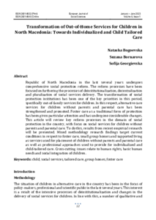Republic of North Macedonia in the last several years undergoes comprehensive social protection reform. The reform processes have been focused on furthering the processes of deinstitutionalization, decentralization and pluralization of social services delivery.
The transformation of social protection institutions has been one of the key priorities in this period, specifically out-of-family services for children. In this respect, alternative care services for children without parents and parental care has been strengthened and promoted. Foster care as a traditional form of protection has been given particular attention and has undergone considerable changes.
This article reviews the key reform processes in the domain of social protection in the the Republic of North Macedonia, with a focus on social services for children without parents and parental care. To do this, results from recent empirical research are presented. Mixed methodology research findings target current conditions in respect to foster care, small group homes and supported living as services used for placement of children without parents and parental care as well as professional approaches used to provide for individualized and child-tailored care. Cross-cutting issues relate to human rights, basic human needs and social integration of children.

